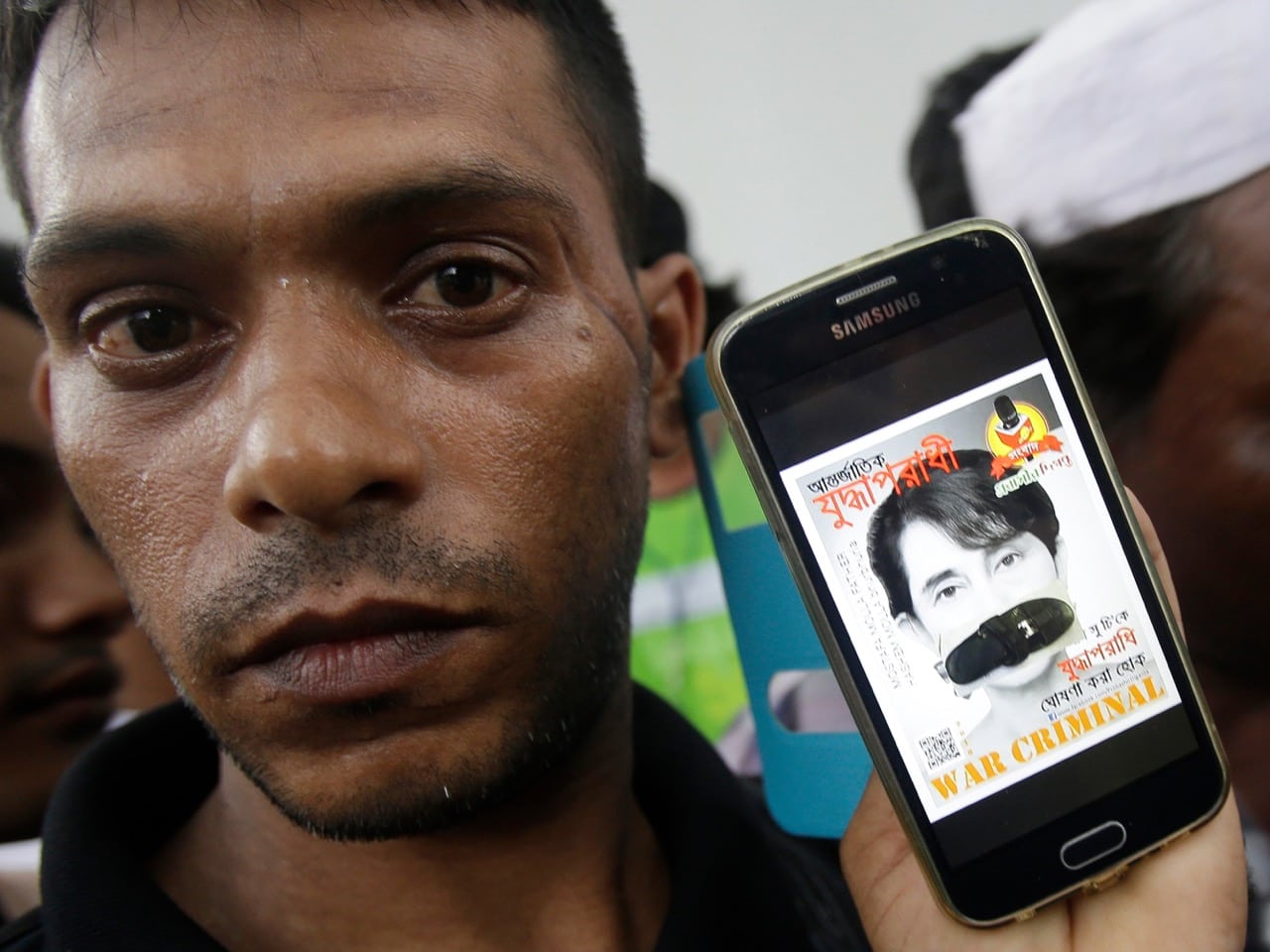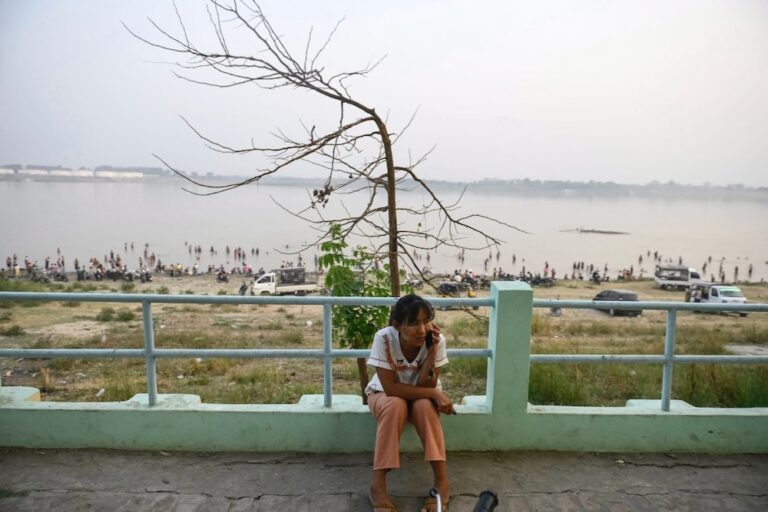Choosing a side in Burma's war of words over the Rohingya crisis is not only placing journalists at the centre of a deadly conflict, it is also sparking calls to revoke a revered Nobel laureate’s award.
A military operation has been taking place in Burma’s western state of Rakhine (Arakan), following attacks on border police outposts on 9 October. According to the UN Coordination of Humanitarian Affairs, at least 30,000 Muslim Rohingyas have been displaced and many others made more vulnerable since the operations to seek out the perpetrators, said to be members of a militant Rohingya group.
Relations between the different ethnic communities in this state has worsened while human rights groups and media have reported widespread abuses, including the rape of women and the burning of buildings across villages in the township of Maungdaw.
Last month, Human Rights Watch (HRW) released satellite images that showed 820 newly identified structures had been destroyed in several villages with Rohingya population, between 10 and 18 November. These were disputed by the Burmese authorities.
Controversial language
Controversies abound in the reporting on and responses to the crisis, whether locally or internationally. One of the major contentions is the use of the term Rohingya as many in the international community do, or Bengali, as used in the country. Even State Counsellor and de facto leader Aung San Suu Kyi has asked others to avoid use of the term. Most media outlets in the local language tend to use the term Bengali (which carries the implication that they are illegal immigrants from Bangladesh), while media outlets that publish content in English and the foreign media use Rohingya or self-identified as Rohingya.
The source of the conflict continues to be debated; whether religious or ethnic, and how far the army had a role in fermenting the divides.
In the course of the reporting, observers have noted changes in the language used to describe the events, for example, a BBC report headlined “Myanmar Rakhine: Inside the closed Rakhine region” replaced an earlier that carried the term ‘genocide’.
Journalists struggle to cover the story
Since the outbreak of communal violence in 2012 in the state, more than 160,000 people have been living in dire conditions in camps. Restrictions on media and aid agencies put in place under ex-president Thein Sein have also been in place since then.
“A government with nothing to hide should have no problem granting access to journalists and human rights investigators,” HRW’s executive director for the Asian division Brad Adams said in a 21 November statement.
In this context, journalists find it difficult to verify accounts of deaths and abuses. As this local editorial reminds its readers, in the coverage of the events in Rakhine state “no one has the monopoly on the truth.” Unfortunately, those who have reported allegations of rape, arson and of ethnic cleansing, have been met with serious repercussions.
When a journalist with the Myanmar Times, Fiona McGregor, was sacked over her article alleging sexual violence, it sparked criticism from international press freedom groups including the Southeast Asian Press Alliance and Reporters Without Borders. In its statement, Article 19 defended the rights of women human rights defenders and journalists who were documenting sexual crimes.
Despite limitations like these, journalists have stayed on the stories as they unfolded and offered perspectives from the ground. For example, The Irrawaddy, which previously worked in exile, reported on the impact of the violence on villagers, who have been rebuilding relations since the 2012 riots. It said the latest series of attacks has raised distrust among the Muslim and Rakhine Buddhist communities. Frontier Myanmar, which publishes a weekly magazine in English, looks at the issue from the perspective of Muslims in the country.
Government criticises reports, “irresponsible” media
The government has lodged complaints with the BBC World Service over its 22 November report “Rohingya Muslims hated and hounded from Burmese Soil”, and over another report quoting John McKissick, the UN refugees agency head based in Cox Bazar, Bangladesh, for saying the government’s goal was “ethnic cleansing of the Muslim minority in Myanmar.”
The military has refuted reports published by Thailand’s Bangkok Post and the Rohingya Blogger, a website run in exile; both which claimed that troops were responsible for setting fire to buildings in villages like Kyetyopyin, Warpate and Dagyisar.
The government has blamed the international community for stoking unrest in the country, and media for spreading inaccurate information and, in some cases, fake news. A story by UK’s Daily Mail of a Rohingya toddler reportedly abused with a stun gun by a military officer, turned out to be untrue and was used to call out the ‘irresponsible’ media. These included the BBC, Al Jazeera, CNN, Channel News Asia and The Independent in Singapore.
Media in the region respond
English language newspapers in the region have been critical of the situation. In challenging the principle of non-interference, a 30 November Jakarta Post editorial warned that ASEAN’s failure to react would be dangerous, as the “continued suppression against a minority pushes them into the embrace of violent extremists.” ASEAN, or the Association of South East Asian Nations, groups 10 members in the region, including Burma. In Thailand, The Nation wrote that the government and the military were to blame if the estranged Muslim community decided to take up arms. In Malaysia, columnists in The Star were critical of the leadership of Suu Kyi, accusing her of remaining silent on the plight of the Rohingyas. The three countries are a destination for many of the Rohingyan refugees.
Media attention briefly shifted to Malaysian Prime Minister Najib Razak, who led a public rally in Kuala Lumpur on 4 December against what he termed was a genocide of the Rohingyas. According to media reports, the Burmese authorities have criticised Najib Razak of intervening in domestic issues, and say his references to the defence of the Muslim community could antagonize relations between the conflicting parties in the country.
Najib’s stand has been seen with skepticism in Malaysia and Burma. The Irrawaddy‘s Aung Zaw writes: “Najib, like many Asian government leaders, is not a human rights crusader. He is a politician accused of corruption. As a Muslim, it is likely he has concern for the plight of displaced fellow Muslims in northern Arakan State, also know as Rakhine State. It is also suspected, however, that he has his own political agenda.”
This caricature by popular cartoonist Aw Pyi Kyal captures the general sentiment of many Burmese of the Malaysian leader who is embroiled in an international money laundering scandal.
What’s next?
Following international outcry, the government announced in mid November the setting up of a national investigation commission to probe allegations of abuses and the causes of the October attacks. The Rakhine State Advisory Commission, set up in August this year and chaired by former UN secretary general Kofi Annan, led a 7-day tour of the affected areas and on 6 December, expressed concern over the abuses that have emerged from the military operations. Suu Kyi is expected to brief her ASEAN colleagues on the situation on 19 December.

APK Cartoon Facebook



